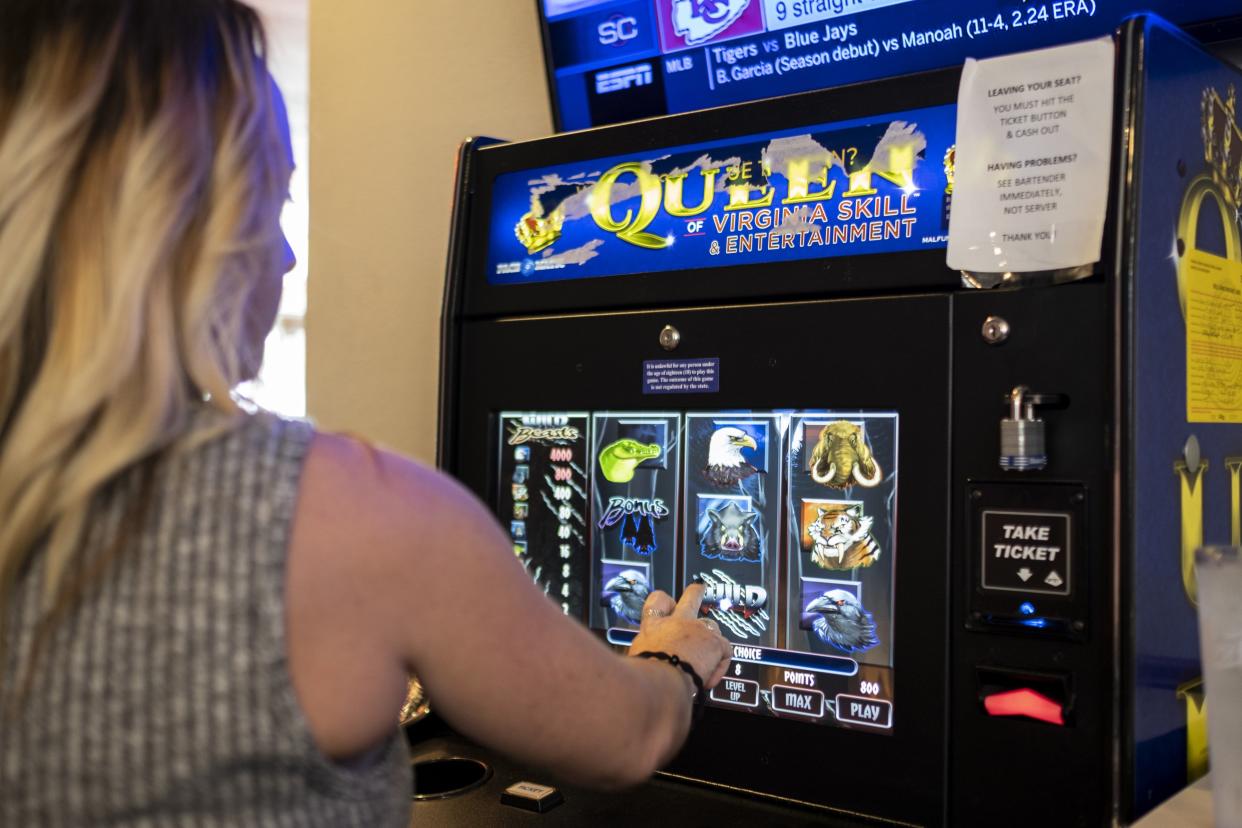Youngkin amends bill to legalize skill games, but bans machines within 35 miles of casinos

- Oops!Something went wrong.Please try again later.
- Oops!Something went wrong.Please try again later.
Gov. Glenn Youngkin is proposing massive changes to legislation that would tax and legalize skill games, including a provision that would ban their use across large swaths of the commonwealth.
“I would much prefer the governor had vetoed the bill outright,” said Sen. Aaron Rouse, a Virginia Beach Democrat who introduced the measure.
On Monday night, the governor put forth dozens of pages of amendments to overhaul the bill, including new restrictions curtailing where the slot machine-like devices could operate.
“No distributor, operator, or host location licensee shall place or maintain any electronic gaming device within any host location’s premises that is located within 35 miles of any casino gaming establishment,” a copy of the amendment states. “…(or within) 35 miles of any racetrack or satellite facility operated by a limited license holder.”
Hampton Roads’ businesses within that distance of Colonial Downs Racetrack in New Kent County or Rivers Casino Portsmouth would subsequently be unable to offer the games.
“That knocks out Virginia Beach, that knocks out Portsmouth,” said Rouse, speaking at a virtual news conference Tuesday.
The governor’s amendment also permits localities to enact ordinances to ban skill games, or to hold referendums on whether they should be allowed.
It places the Virginia Lottery in charge of overseeing the games, as opposed to the Virginia Alcoholic Beverage Control Authority. It states the Virginia Lottery could begin accepting applications for licensure on Jan. 1, 2025.
It directs the Secretary of Finance to approve an interest-free treasury loan of $25 million to the Virginia Lottery to implement a real time central accounting system for electronic gaming devices. Licenses could not take effect until the system was fully functional.
Additionally, the amendment would levy a 35% tax on skill games, a 10% increase from the bill that passed the General Assembly.
“A Republican governor has increased taxes on small businesses,” Rouse said. “I don’t know if that’s the effects of the eclipse or what but that in itself was very surprising.”
The legislation likely presented a tricky situation for the governor. Skill games have outspoken supporters — and opponents — on both sides of the aisle.
Those who support the games say they give a significant boost to businesses while also bringing in tax revenue for the state. Some have argued it’s no different than other forms of gambling already allowed in Virginia, such as casinos and lottery tickets.
“This is a small-business bill,” Rouse told a Senate committee in January. “It is looking out for the mom-and-pop small businesses in many of our communities.”
But opponents of the games have shared a range of concerns about oversight and enforcement. Some worried that allowing skill games to proliferate across the state could lead to a spike in gambling addictions or have a negative impact on children.
“They are being desensitized to the gambling,” Todd Gathje, vice president of government relations with The Family Foundation, a conservative Christian lobbying organization, told the committee. “That is the concern right there.”
Meanwhile, casino lobbyists argued it was unfair skill games wouldn’t be required to undergo a local referendum. Casinos must get approval from localities before launching.
Youngkin told a gaggle of reporters Monday in Richmond that he was working to find a balanced solution.
“I had major problems with the bill,” Youngkin said, as the midnight deadline for taking action on legislation approached. “We have been working to see if we can address those.”
The legislation had strong bipartisan support in the Senate, passing in a 32-8 vote. In the House, the measure was approved by a smaller margin of 51-45.
In a Tuesday statement, Virginia Merchants and Amusement Coalition President Rich Kelly called the amendments “nothing short of a ban on skill games” and asserted it showed the governor was more interested in protecting out-of-state gambling corporations that local businesses in Virginia.
To overcome any of the governor’s changes, lawmakers would have to rally 2/3 support in each of the chambers. The General Assembly will reconvene in Richmond for a veto session on April 17.
The legality of skill games has been in flux for years.
The General Assembly initially passed legislation outlawing the games in 2020, but then-Gov. Ralph Northam delayed the ban to help the state raise money for a COVID-19 relief fund.
The ban took effect in 2021, until state Sen. Bill Stanley, an attorney, filed a lawsuit on behalf of client Hermie Sadler alleging it violated small businesses’ constitutional rights. An injunction allowed the games to continue while the lawsuit was pending. The Supreme Court of Virginia in October overturned the injunction — arguing the case was unlikely to succeed — and a lower court subsequently dismissed the lawsuit on Nov. 13.
Business owners around Hampton Roads reluctantly unplugged their machines in November as enforcement took effect.
Boyd Melchor, owner of Kelly’s Tavern, a local franchise spanning from Newport News to Virginia Beach, supported the original bill and was looking forward to turning his skill games back on if the measure was signed into law.
“The governor is awakening a sleeping giant,” Melchor said Tuesday. “There are an awful lot of us out here who are adversely affected by this and I will leave it at that.”
Katie King, katie.king@virginiamedia.com

